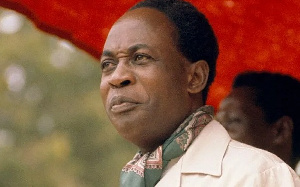Ghana’s first president and Prime Minister, Osageyfo Dr Kwame Nkrumah Upon attaining independence in 1957, Osagyefo Dr. Kwame Nkrumah the new leader of the country found energy as an enabler to economic liberation, having achieved political liberation.
Osagyefo saw the need for adequate, accessible, consistent, and affordable electricity to help boost agriculture, increasing trade, improving transportation, expanding industries; serving as building blocks to drive Ghana’s economic growth, industrial, investment and development programmes.
Osagyefo was also led with the understanding that hydrocarbons are a prime factor to production, and the world has traditionally been an oil-based economy. He therefore set out to build the necessary structures to explore the use of domestic hydrocarbons, in case commercial discovery is made.
Hydrocarbon Developments
Ghana’s hydrocarbon discovery in commercial quantities in 2007 was not accidental, but rather years of concerted effort by all.
The exploration for oil and gas in Ghana started in 1896 in onshore Tano basin in the Western Region, according to the “Ghana Geological Survey Bulletin No. 40”. At the time, wells were drilled, without geological understanding and the benefit of seismic data.
International oil companies including the French oil company Societe Francaise de Petrole (SFP) were latter to join in the exploration of oil and gas in Ghana, encountering heavy oil, light oil and gas in the drilling process in the onshore Tano basin around Bonyere, Epunsa, and Kobnaswaso, and getting very good oil indications, though not on commercial scale.
During the First Republic, onshore exploration activities continued to cover the Accra/Keta and Voltaian basins. However, in 1967 the focus shifted from onshore to offshore exploration with oil companies signing petroleum agreements (PAs) to explore the continental shelf, leading to the Saltpond oil field by Signal/Amoco Group in 1970. In the decade that followed, exploration for commercial oil continued both onshore and offshore, including the drilling of the first deep-water well in the CTP.
With the formation of the Ghana National Petroleum Corporation (GNPC) in 1983, the passage of Petroleum Exploration and Production Law (1984) and promulgation of Petroleum Income Tax Law (1987), several Petroleum Agreements with international oil companies such as Atlantic Richfield Corporation (ARCO), Amoco, and Diamond Shamrock (Onshore Keta) were executed.
Within 2001 and 2007, exploration for commercial hydrocarbons intensified, shifting focus from shallow water to deep-water areas, with some independent Oil Companies such as Kosmos Energy, Hess Corporation and Tullow Oil acquiring exploration and production rights over the areas.
The wells drilled proved […]
